Singkhon Pass
Singkhon Pass[2] (Thai: ด่านสิงขร), also referred to as Sing Khon and as Maw Daung after the name of the Burmese town west of the border,[3] is a pass across the Tenasserim Hills on the border between Thailand and Myanmar, at an elevation of 245 metres (804 ft). The pass is close to the narrowest point of Thailand in Khlong Wan (คลองวาฬ) subdistrict, Mueang Prachuap Khiri Khan District, Prachuap Khiri Khan Province.
| Singkhon Pass ด่านสิงขร | |
|---|---|
| Maw Daung | |
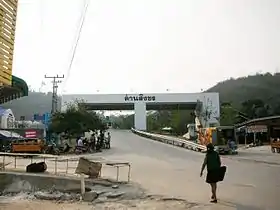 Border checkpoint, Singkhon Pass | |
| Elevation | 245 m (804 ft)[1] |
| Location | Myanmar–Thailand border |
| Range | Tenasserim Hills |
| Coordinates | 11°47′22″N 99°38′27″E |
 Dan Sing Khon Location of Singkhon Pass on the Myanmar/Thailand border | |
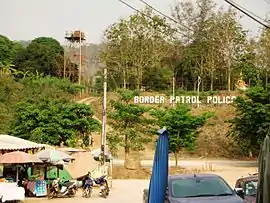
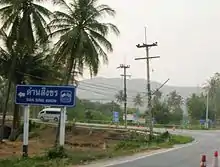
History
Singkhon pass was important during the wars between Siam and the Burmese, and also during World War II, when the Mergui Road was constructed by the Japanese invaders. The pass, on Thai Hwy 1039, about 14 km (8.7 mi) to the west of its junction with Thailand Route 41, was formerly closed, but was informally opened since May 2013[4] as a result of bilateral agreements.[5]
The road on the Burmese side leads to Myeik – via Mawdaung and Tanintharyi – and has been recently been repaired.[6] Singkhon Pass has been upgraded since late-2014 with improved public utilities, urban planning, and landscaping.[7]
The official inauguration ceremony of the border crossing took place on 23 May 2015 with a crowd of about 2000 from both sides of the border attending the event.[8]
Tourism
The Singkhon Pass border checkpoint is currently also being developed as a tourist attraction with new shops opening in the area by the road on the Thai side. It is also a place whereby traffic from one side of the road must change over to drive on the opposite side of the road. [9]
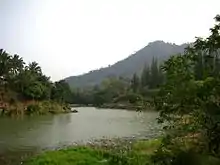 Lake by Singkhon Pass border post. |
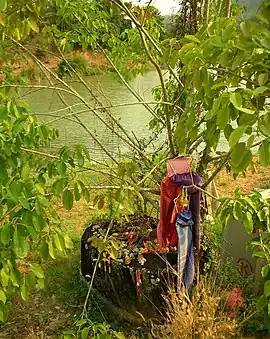 Stump of a Hopea odorata tree (ตะเคียน) with offerings to Nang Ta-khian near the shrine close to the lake. |
References
- GoogleEarth
- "Singkhon Checkpoint to Open this Year". Archived from the original on 2013-07-03. Retrieved 2015-04-02.
- Maw-daung Pass
- "Dan Sing Khon border crossing upgrade". Archived from the original on 2015-04-05. Retrieved 2015-04-03.
- Singkhon – Permanent Checkpoint to Open in December
- Permanent Thai-Myanmar checkpoint officially opens in Prachuap Khiri Khan
- "NNT - Prachuap Khiri Khan to upgrade Sing Khon border crossing". Archived from the original on 2015-04-05. Retrieved 2015-04-03.
- NNT - ชาวไทยและเมียนมากว่า 2,000 คนร่วมพิธีเฉลิมฉลองการเปิดจุดผ่อนปรนพิเศษด่านสิงขรอย่างยิ่งใหญ่ เปิดประตูการค้าชายแดนอาเซียน
- Pattaya Mail - Dan Sing Khon border crossing upgrade under way
External links
 Media related to Singkhon Pass at Wikimedia Commons
Media related to Singkhon Pass at Wikimedia Commons- Singkhon Pass Border Market - TripAdvisor
- Tourism - Prachuap Khiri Khan